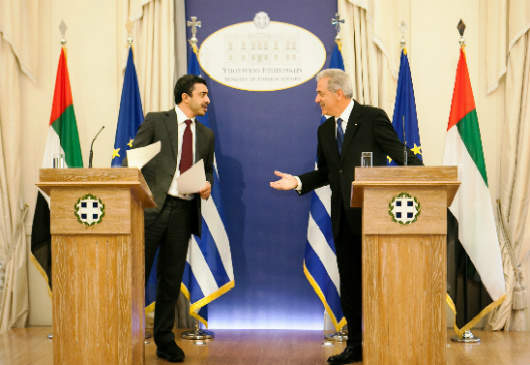 D. AVRAMOPOULOS: I had the pleasure and honor today of receiving the Foreign Minister of the United Arab Emirates, His Highness Sheikh Abdullah bin Zayed Al Nahyan, with whom we had very friendly talks, in an equally warm and friendly atmosphere, on issues of bilateral and international interest.
D. AVRAMOPOULOS: I had the pleasure and honor today of receiving the Foreign Minister of the United Arab Emirates, His Highness Sheikh Abdullah bin Zayed Al Nahyan, with whom we had very friendly talks, in an equally warm and friendly atmosphere, on issues of bilateral and international interest.
We looked at the potential for further development, first of all, of our trade and economic relations. I briefed Sheikh Abdullah on our efforts to improve the economic climate. The creation of the right conditions for foreign investments is one of the Greek government’s main concerns. In this context, I had the opportunity to set out in detail Greece’s comparative advantages.
We also explored ways to increase tourist flows from the United Arab Emirates. I had the opportunity to mention Greece’s major initiatives aimed at abolishing Schengen visas for citizens of the Emirates. And when this development is achieved, it is certain to strengthen the influx of tourists into Greece from the Emirates.
We also talked about ways to enhance our cultural cooperation. Abu Dhabi is implementing an especially ambitious plan to construct branches of world-famous museums. And we think that this excellent initiative should include a museum with exhibits of Hellenic culture, with its very close links to the Middle East.
Our will to further develop and expand our cooperation is set out in a number of important texts. These bilateral agreements are in the final stages of preparation, and we hope to sign and ratify them at the soonest possible time.
We also discussed the prospect of convening the second Greek-UAE Cooperation Committee, in Abu Dhabi, on the level of Foreign Ministers and other Ministers.
We also exchanged views on the Syrian crisis, which is currently the biggest threat to the stability of our region. From the outset, Greece has been in favor of a political solution. And we continue to believe that there is no military solution to the bloody impasse the friendly Syrian people have come to. The U.S.-Russian initiative for the convening of an international conference in Geneva creates hopes for an end to the crisis, and it deserves everyone’s real, practical support.
I conveyed to Sheikh Abdullah my impressions from my recent trip to Israel and the Palestinian Authority, as well as the sincere desire I ascertained in both places to capitalize on the Kerry initiative for reopening the Middle East peace process.
Once again, I welcome His Highness Sheikh Abdullah, and, thanking him for our very constructive talks, I give him the floor.
SHEIKH ABDULLAH: Your Excellency, let me start by saying thank you. I would like to take this opportunity by thanking your government, your President, the Prime Minister, yourself, and the people of Greece. It is always wonderful to come back to Athens. There are a lot of similarities between us. Sometimes we feel that you are closer to us, actually we always feel you are closer to us than any European country. We know of your efforts in promoting the United Arab Emirates to be on the Schengen list of waiver, and we are very honored that Greece is taking such a strong role in that. It just tells us how confident you are about the United Arab Emirates and the United Arab Emirates’ people, but how enthusiastic you are about the relationship.
The Emirates and Greece have had a good relationship on all levels – economic, political, cultural, military-to-military – but we would like to see it better. We are delighted that the indicators, when it comes to trade between our two countries, have started to rise again. It just tells us that your efforts in stabilizing the economy and moving it in the right direction in Greece are working. I would like to congratulate you on that.
Your Excellency, if you will allow me, I will just stress that during our talks today we had some good talks on regional efforts that Greece is making. You mentioned the peace process. I did raise and thanked Greece on its efforts to get both Serbia and Kosovo to have a frank and a serious talk between them. Greece has played an important role in the Balkans, and we believe that your efforts here can help create even a better future for your region.
Of course, Syria was one of the key issues which we discussed today. We are obviously outraged at the humanitarian situation in Syria and the effects that the situation in Syria is creating on its neighborhood. These are some serious challenges, not only for the region, but the entire international community, and the next few weeks there is a huge international effort of relief, which was called for by the United Nations.
We believe that we cannot be only the receiving end, and that is why the Geneva II process is extremely important. We hope that it happens as soon as possible, but also it is fruitful for the Syrian people, and that is the only way possible, at least we see today, to face these challenges.
Finally, Your Excellency, I would just say once again how delighted I am here, and how much I am looking forward to a further cooperation. One of the items that I am going back home very pleased with is that we decided to further our cooperation when it comes to health, when it comes to education, but also when it comes to culture, and I hope that in the next joint commission between our two countries we will have even clearer indicators on that.
Thank you, Your Excellency.
June 11, 2013


